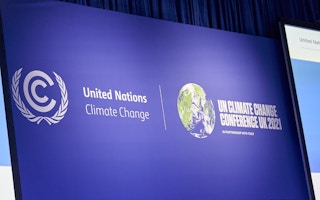While Russia’s invasion of Ukraine is capturing global headlines, Covid-19 continues to wreak socioeconomic havoc around the world. The pandemic has taken more than six million lives, pushed 124 million people into extreme poverty, and impeded progress toward achieving the 2030 Sustainable Development Goals.
Fortunately, around five billion people have now received at least one dose of a Covid-19 vaccine, and the World Health Organization and Gavi have set a goal of vaccinating 70 per cent of people in all countries by this July.
Notwithstanding the horrific war in Ukraine, the pandemic and its lasting toll will continue to top the list of pressing global concerns alongside climate change. The effects of the latter crisis are already being felt daily, as the Intergovernmental Panel on Climate Change’s Sixth Assessment Report shows.
Just recently, extreme temperatures and droughts have ravaged West Asia and North Africa. Rising sea levels are threatening many island states and low-lying countries. Catastrophic flooding has inundated parts of Europe and China. And wildfires have torn across the American West and large swaths of Australia.
Scientists now warn that “business as usual” will likely increase the average global temperature, relative to the pre-industrial level, by a catastrophic 3-4º Celsius by the end of the century. To keep global warming at a far safer level, below 1.5ºC, carbon dioxide emissions will need to fall by 45 per cent from 2010 levels by 2030, and then to net-zero by 2050.
Now that we know Omicron to be less deadly than earlier Covid-19 variants, we should use this moment to build on the momentum generated last November at the COP26 climate summit in Glasgow. The world needs to draft a recovery plan that goes well beyond pandemic response by also starting to tackle climate change. The recovery must be not only broad-based but also green.
What does this mean in practical terms? In advance of the 20th edition of the Doha Forum on March 26-27, our organisations teamed up to explore 20 targeted initiatives for driving a just, healthy, and sustainable global recovery. These are outlined in a recently published report, titled “Building Back Together & Greener”.
To make the recovery green and sustainable, we propose a Global Green Hydrogen Alliance to facilitate more efficient, climate-friendly methods of producing hydrogen. Once established, the next steps would include setting up a global inventory of green hydrogen programs, protecting intellectual-property and licensing rights while expanding global access, and encouraging alliance-wide standard setting for safe storage and transportation.
A fair and inclusive recovery requires more investment in human capital – particularly to upgrade workers’ skills – and an emphasis on supporting the people who are most at risk. Planning processes should privilege public and private financing for low-carbon activities and infrastructure that have the greatest potential to generate jobs for young people and other vulnerable groups facing employment challenges.
To ensure that the recovery supports health and well-being, we need a Global Fund for Social Protection to assist developing-country governments in providing adequate social programs. Such a fund would boost coordination efforts and mobilise domestic and external resources to provide a buffer against economic shocks, including those induced by climate-related environmental disasters.
Finally, to realise the potential of digitalisation in advancing the recovery, we need to promote large-scale investment in information and communications technology infrastructure, both to achieve digital equity and to leverage the economic, health, and environmental potential of new technologies. International organisations and governments should work with businesses to provide effective and reliable digital connectivity, including through targeted investments in the steady digitalisation of most, if not all, public services.
Several significant international meetings will be held over the next seven months, each of which will provide an opportunity to take steps toward a shared recovery. But marshalling governments, businesses, and civil society behind a coherent, representative, and sustained global implementation strategy will require a culminating meeting.
That is why we are calling for a “Green Pandemic Recovery Summit,” to be orchestrated by the United Nations and the G20. A two-day event, timed to coincide with the annual UN General Assembly in September, would help to ensure that political leaders at the highest levels commit to pursuing sustainable and equitable socioeconomic development in the post-Covid era.
“
The trillions of dollars spent by wealthy countries during the pandemic shows that there are financial tools available to tackle serious challenges.
The trillions of dollars spent by wealthy countries during the pandemic shows that there are financial tools available to tackle serious challenges. What is needed is political will, creative market incentives, and a practical blueprint, with clear goals, timelines, and programming ideas.
Resources drawn from related initiatives can help. The 2030 Agenda for Sustainable Development, the Build Back Better World partnership, and national-level “green deals” are generally aligned in their key objectives. UN Secretary-General António Guterres’s “Our Common Agenda” report offers additional timely and ambitious ideas for delivering global public goods and addressing major risks.
People and countries are understandably still focused on the pandemic, the fear that humanity is nearing the point of no return with respect to climate change, the war in Ukraine, and other global threats. Fortunately, we already have the multilateral institutions that we need to forge a global political consensus for tackling these overlapping crises. We now must leverage these tools accordingly.
Lolwah Al-Khater is the assistant foreign minister of Qatar, and executive director of the Doha Forum. Brian Finlay is president and CEO of the Stimson Center, a US-based think tank.
© Project Syndicate 1995–2022










